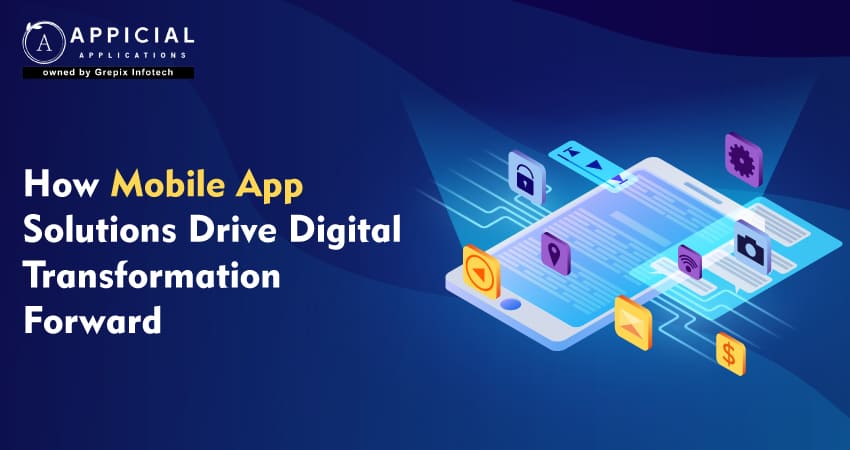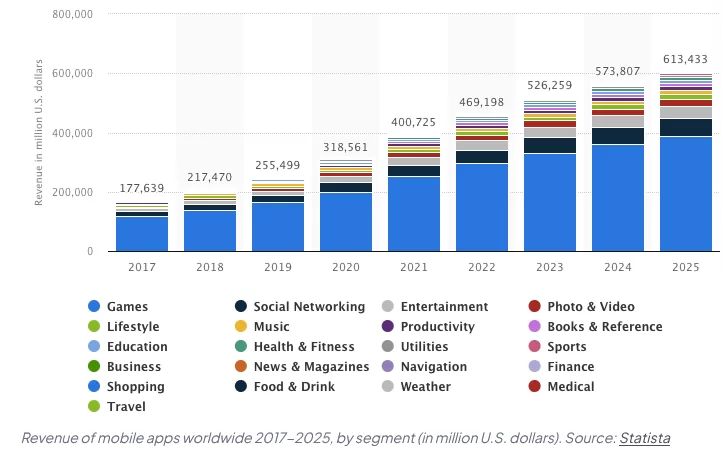
How Mobile App Solutions Drive Digital Transformation Forward
In today's rapidly evolving digital landscape, the drive towards digital transformation is no longer a luxury but a necessity for businesses aiming to stay competitive. Mobile app solutions have emerged as a cornerstone of this transformation, enabling organizations to innovate, streamline operations, and enhance customer experiences. As a leading mobile app development company, we understand the pivotal role these solutions play in driving digital transformation forward. This blog explores the multifaceted impact of mobile app solutions on digital transformation, highlighting key areas where they make a significant difference.
In today's competitive digital landscape, mobile app solutions are pivotal in driving digital transformation. They enhance customer engagement through personalized experiences, streamline business operations, and enable data-driven decision-making. Mobile apps also foster innovation and agility, allowing businesses to adapt quickly to market changes. Successful examples include Walmart's seamless shopping app and Kaiser Permanente's patient care app. Despite challenges like security, integration, and user adoption, the future of mobile apps is bright with advancements in 5G, AI, and IoT. Embracing mobile app solutions is essential for businesses to stay competitive and deliver exceptional value to customers.
Understanding Digital Transformation
Digital transformation refers to the integration of digital technology into all areas of a business, fundamentally changing how organizations operate and deliver value to customers. It involves a cultural shift that requires organizations to continually challenge the status quo, experiment, and become comfortable with failure. Successful digital transformation leverages technologies such as cloud computing, artificial intelligence (AI), Internet of Things (IoT), and, critically, mobile applications.
The Role of Mobile App Solutions in Digital Transformation
By 2025, revenue from mobile apps is expected to soar across most segments, reaching approximately $613 billion. In 2023 alone, mobile apps are projected to generate over $935 billion in revenue. The combined number of mobile apps available on the Google Play Store and Apple App Store exceeds 5.7 million, with the Apple App Store alone boasting more than 2.2 million applications. In 2021, these two major app stores generated a combined revenue of $111 billion. Typically, a smartphone user accesses around 9-10 apps daily and about 30 apps monthly. On average, a person in the United States has around 80 apps installed on their smartphone, with mobile applications accounting for 85% of the total time users spend on their devices. In 2020, global app downloads reached an astounding 299 billion. Android, with a market share of 85%, is the most widely used mobile operating system worldwide, boasting over three billion active users and 108 billion downloads in 2020 alone. The global e-learning market is projected to reach $650 billion by 2025, with a Compound Annual Growth Rate (CAGR) of 21% expected between 2021 and 2027.

1. Enhancing Customer Engagement and Experience
Mobile apps have revolutionized the way businesses interact with their customers. By providing a direct channel to consumers, mobile apps enable personalized communication and engagement. Features like push notifications, in-app messaging, and personalized content allow businesses to connect with customers in real-time, offering tailored experiences that drive loyalty and satisfaction.
For instance, retail businesses use mobile apps to offer personalized shopping experiences, recommend products based on user behavior, and provide exclusive offers. This not only enhances customer satisfaction but also increases sales and customer retention.
2. Streamlining Business Operations
Mobile apps are not just customer-facing; they play a crucial role in optimizing internal business processes. Enterprise mobile apps facilitate seamless communication, collaboration, and information sharing among employees, regardless of their location. This is particularly valuable in today's remote work environment.
Apps designed for project management, customer relationship management (CRM), and supply chain management (SCM) enable employees to access real-time data, make informed decisions, and improve productivity. By automating routine tasks and providing instant access to critical information, mobile apps help businesses operate more efficiently and respond swiftly to market changes.
3. Enabling Data-Driven Decision Making
Data is at the heart of digital transformation. Mobile apps generate a wealth of data that, when analyzed, can provide valuable insights into customer behavior, market trends, and operational efficiency. Advanced analytics tools integrated into mobile apps allow businesses to track key performance indicators (KPIs), monitor user engagement, and identify areas for improvement.
For example, a healthcare provider can use mobile apps to collect patient data, track health metrics, and provide personalized treatment plans. By leveraging this data, healthcare providers can enhance patient outcomes, optimize resource allocation, and improve overall service quality.
4. Facilitating Innovation and Agility
Digital transformation requires businesses to be agile and innovative. Mobile app solutions foster a culture of innovation by enabling rapid prototyping, testing, and deployment of new ideas. Agile development methodologies used in mobile app development allow businesses to iterate quickly, gather user feedback, and refine their offerings.
This approach is particularly beneficial in industries where customer preferences and market conditions change rapidly. By leveraging mobile apps, businesses can stay ahead of the curve, launch new products and services faster, and continuously adapt to evolving customer needs.
Also Read: Starting Your Ride: The Ultimate Guide to Developing an Uber-Like App
Case Studies: Mobile App Solutions Driving Digital Transformation
Retail: Walmart
Walmart has been at the forefront of digital transformation in the retail sector. The company’s mobile app offers a seamless shopping experience with features like mobile payments, order tracking, and personalized recommendations. Walmart's app integrates with its online and physical stores, providing a unified shopping experience.
By leveraging mobile technology, Walmart has been able to enhance customer engagement, streamline operations, and gather valuable data to drive strategic decisions. The app has played a crucial role in Walmart’s ability to compete with e-commerce giants like Amazon.
Healthcare: Kaiser Permanente
Kaiser Permanente, one of the largest healthcare providers in the United States, has embraced mobile app solutions to improve patient care. The Kaiser Permanente app allows patients to schedule appointments, access medical records, and communicate with healthcare providers.
The app also offers telehealth services, enabling patients to consult with doctors remotely. This has not only improved patient access to healthcare but also optimized resource utilization and reduced operational costs. By integrating mobile technology into its services, Kaiser Permanente has set a benchmark for digital transformation in the healthcare industry.
Challenges and Considerations
While mobile app solutions offer immense potential for driving digital transformation, businesses must navigate several challenges to realize their full benefits.
Security and Privacy
With the increasing use of mobile apps, data security and privacy have become paramount concerns. Businesses must ensure that their apps comply with data protection regulations and implement robust security measures to safeguard sensitive information. This includes encryption, secure authentication, and regular security audits.
Integration with Existing Systems
For mobile app solutions to be effective, they must integrate seamlessly with existing IT infrastructure. Businesses often face challenges in ensuring compatibility and interoperability between new mobile apps and legacy systems. A well-planned integration strategy is essential to avoid disruptions and maximize the benefits of digital transformation.
User Adoption
The success of mobile app solutions depends on user adoption. Businesses must invest in user education and training to ensure that employees and customers are comfortable using new apps. A user-friendly interface, comprehensive onboarding processes, and ongoing support are crucial to driving adoption and maximizing the impact of mobile apps.
The Future of Mobile App Solutions in Digital Transformation
As technology continues to evolve, the role of mobile app solutions in digital transformation will only grow. Emerging technologies such as 5G, AI, and IoT will further enhance the capabilities of mobile apps, enabling businesses to offer more sophisticated and personalized experiences.
5G Technology
The advent of 5G technology promises to revolutionize mobile app development. With faster data speeds and lower latency, 5G will enable more responsive and immersive app experiences. This will open up new possibilities for applications in augmented reality (AR), virtual reality (VR), and real-time data processing.
Artificial Intelligence
AI-powered mobile apps will provide even deeper insights into customer behavior and operational efficiency. Machine learning algorithms can analyze vast amounts of data to identify patterns, predict trends, and automate decision-making processes. This will enable businesses to deliver more personalized and proactive services.
Internet of Things
The integration of IoT with mobile apps will create a more connected and intelligent ecosystem. Mobile apps will serve as the interface for controlling and monitoring IoT devices, enabling businesses to optimize operations, enhance customer experiences, and gather real-time data. For example, in smart homes, mobile apps can control lighting, security, and appliances, providing a seamless and convenient user experience.
Conclusion
Mobile app solutions are a driving force behind digital transformation, enabling businesses to enhance customer engagement, streamline operations, and make data-driven decisions. As a mobile app development company, we are committed to helping businesses harness the power of mobile technology to innovate and thrive in the digital age.
By embracing mobile app solutions, businesses can stay ahead of the competition, adapt to changing market conditions, and deliver exceptional value to their customers. The journey of digital transformation is ongoing, and mobile apps will continue to play a pivotal role in shaping the future of business.
In conclusion, the integration of mobile app solutions into business strategies is not just a trend but a fundamental shift towards a more agile, innovative, and customer-centric approach. As technology evolves, the potential of mobile apps to drive digital transformation will only increase, making them an indispensable tool for businesses aiming to succeed in the digital era.
Launch your vision with our mobile app development company, where innovation meets excellence to create cutting-edge mobile solutions."







